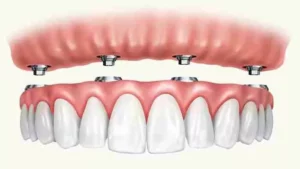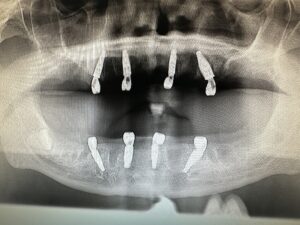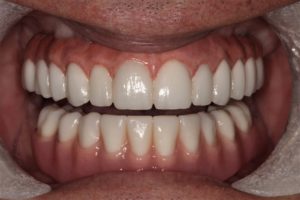If you’re considering full mouth dental implants, you probably want to know, how many implants for full mouth restoration? On average, between four and eight implants per jaw are needed.
This number depends on individual factors like bone density and oral health. In this article, we’ll break down what affects the number of implants needed, and explore the common techniques used for full mouth restoration.
Key Takeaways
- Dental implants serve as stable, artificial tooth roots that integrate with the jawbone, offering a secure and natural-feeling tooth replacement solution.
- The number of implants needed for full mouth restoration typically ranges from four to eight per jaw, depending on individual factors such as bone density and oral health.
- Techniques like All-on-4 and All-on-6 provide efficient methods for full mouth restoration, using fewer implants to support a complete arch of prosthetic teeth while enhancing stability and comfort.
The Basics of Dental Implants
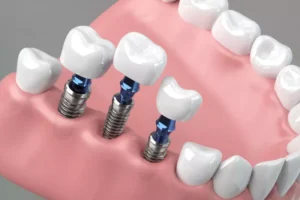 Dental implants are metal structures, typically made of titanium posts, that replace the roots of teeth in the jawbone. These implants serve as artificial tooth roots, providing a stable base for attaching prosthetic teeth. The primary design purpose of dental implants is to restore both function and aesthetics, closely mimicking natural teeth.
Dental implants are metal structures, typically made of titanium posts, that replace the roots of teeth in the jawbone. These implants serve as artificial tooth roots, providing a stable base for attaching prosthetic teeth. The primary design purpose of dental implants is to restore both function and aesthetics, closely mimicking natural teeth.
One of the standout benefits of a dental implant is their ability to offer a stable and comfortable solution for tooth replacement. Unlike traditional dentures, which can slip and cause discomfort, dental implants integrate with the jawbone, providing a secure fit that feels natural. This integration, known as osseointegration, requires sufficient bone density, which is critical for the long-term success of one dental implant and an implant denture.
Additionally, healthy gums are essential for the stability of dental implants. Gum disease can lead to complications and affect the longevity of the implants. Maintaining good oral health is vital for the success of full mouth dental implants.
Determining the Number of Implants Needed
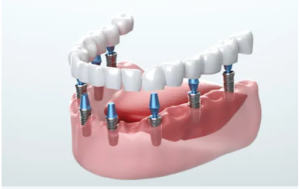
Several factors influence the number of implants required:
- The condition of the jawbone is a significant determinant.
- Patients with lower jawbone density may need fewer implants or additional procedures like bone grafting.
- A dental professional’s thorough assessment determines the precise number of implants required for each patient.
Individual health and bone quality significantly influence the number of dental implants required. A personalized treatment plan, created post-comprehensive dental examination, tailors implant placement to the patient’s specific needs. Careful planning ensures optimal outcomes for full mouth restoration.
Full Mouth Restoration Techniques
When it comes to full mouth restoration, there are two primary techniques that stand out: the All-on-4 and All-on-6 methods. Both techniques are designed for individuals who have lost several teeth and utilize a strategic number of implants to support a complete arch of prosthetic teeth. These treatment options offer efficient solutions for replacing an entire arch of teeth using fewer implants.
The All-on-4 technique uses four implants per jaw, while the All-on-6 method employs six implants, offering additional stability. Exploring how many implants each technique uses, including two to four implants, will reveal their unique benefits and processes.
All-on-4 Technique
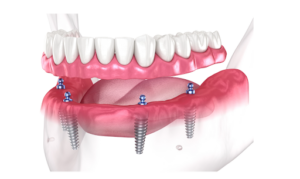
One of the main advantages of the All-on-4 technique is its efficiency. Implants are positioned to maximize available bone, often removing the need for bone grafting. This approach quickens and simplifies the procedure for many patients.
Moreover, the All-on-4 technique allows for immediate placement of a full arch prosthesis on the same day as the implant surgery. Patients often leave with a new smile after one visit, drastically cutting down the wait time for permanent teeth.
All-on-6 Technique
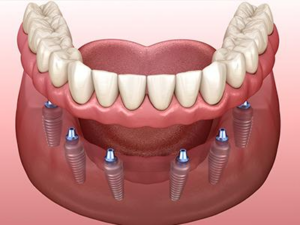
The All-on-6 technique strategically places six implants to evenly distribute the load across the jawbone. This not only enhances stability but also offers greater support for the prosthetic teeth, ensuring a more natural feel and function.
The All-on-6 method’s added stability significantly enhances the comfort and functionality of dental implants, making it a preferred choice for full mouth restoration.
Benefits of Full Mouth Dental Implants
Full mouth dental implants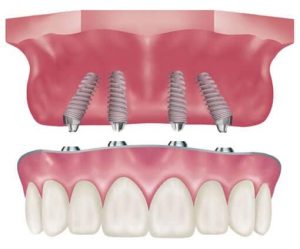
Beyond aesthetics, dental implants boost oral health by:
- Restoring function
- Facilitating proper oral hygiene
- Stimulating the jawbone like natural tooth roots, which prevents bone loss and maintains the jaw’s structure and integrity.
Dental implants’ stability and comfort make them superior to traditional dentures. Patients can enjoy a new smile without worrying about slipping teeth, making activities like eating and speaking more enjoyable. Advances in dental technology have further enhanced the effectiveness of these solutions.
Factors Influencing Implant Placement
Several factors influence the placement of dental implants, including bone density and the need for additional procedures like bone grafting. Implant integration with the jawbone maintains bone density, preventing deterioration linked to tooth loss.
Other factors include:
- The patient’s age, as implants are typically not recommended for those with developing jaws
- Overall oral health
- The desired restoration type
- The patient’s health conditions
A dental professional’s comprehensive evaluation ensures all factors are considered for a successful informed decision regarding implant placement through a thorough examination.
The Procedure for Full Mouth Implants
The procedure for full mouth dental implants involves several stages, starting with a comprehensive dental examination and imaging to create a personalized treatment plan. The initial stage involves drilling the jawbone to place titanium posts as artificial tooth roots.
During the surgery, the All-on-4 method allows for the immediate placement of a full arch prosthesis, often with temporary teeth placed the same day. This immediate placement reduces the waiting time for patients, providing them with a new smile in a single tooth visit.
Osseointegration, the healing process, involves the following steps:
- The bone fuses with implants to ensure stability.
- After integration, an abutment is attached to connect to the final prosthetic teeth.
- The final crown or denture is then created, ensuring a natural-looking and functional fit for the patient.
Are You a Candidate for Full Mouth Implants?
Good overall health and sufficient jawbone density are key factors in determining if someone is a suitable candidate for dental implants. Chronic conditions like diabetes or heart disease necessitate careful evaluation before considering implants.
Jawbone density is vital for successful implant placement, ensuring stability and integration. Preventing bone loss and healing abilities also impact implant success; conditions like diabetes may impede recovery in the lower jaw.
Lifestyle factors like smoking significantly increase the risk of implant failure due to impaired healing. Certain medical conditions and medications can also complicate the healing process. A dental professional’s thorough evaluation, considering overall health, the condition of remaining teeth and gums, and lifestyle, is crucial in determining implant suitability.
Proper Care for Dental Implants
Proper oral hygiene is paramount to the success of dental implants. Brushing twice daily with a soft-bristle brush and flossing around implants are crucial practices. An antimicrobial mouth rinse can help prevent infections around implants.
To protect and maintain dental implants, consider the following:
- Avoid very hard or sticky foods to prevent potential damage.
- Avoid smoking to significantly improve healing and maintenance.
- Attend regular dental visits for cleanings and check-ups essential for implant upkeep.
Monitoring for implant failure signs like pain or swelling is important for timely intervention. Following your dentist’s post-operative care instructions is critical for successful healing and long-term implant maintenance.
Summary
Full mouth dental implants offer a transformative solution for individuals seeking to replace missing teeth. They provide a permanent, stable, and aesthetically pleasing alternative to traditional dentures, improving both oral health and quality of life.
Understanding the number of implants needed, the techniques available, and the factors influencing implant placement is crucial for making an informed decision. Consulting with a dental professional ensures that you receive personalized advice and care tailored to your specific needs.
Frequently Asked Questions
How many dental implants are needed for a full mouth restoration?
For a full mouth restoration, you typically need between four and eight dental implants per jaw, depending on individual factors like bone density and oral health. This range ensures optimal stability and function.
What are the benefits of full mouth dental implants over traditional dentures?
Full mouth dental implants provide a permanent and stable solution that enhances comfort and prevents bone loss, offering a more natural-looking smile compared to traditional dentures, which can shift and cause discomfort.
What is the All-on-4 technique?
The All-on-4 technique involves placing four implants per jaw to securely support a full set of teeth, making it an effective option for patients with insufficient jawbone density. This innovative approach ensures stability and tends to enhance overall dental function.
Are there any health conditions that might affect my eligibility for dental implants?
Yes, health conditions like diabetes, heart disease, and smoking can influence your eligibility for dental implants, as they may affect healing and integration. It’s essential to have a thorough evaluation by a dental professional to assess your specific situation.
How do I care for my dental implants?
To ensure the longevity of your dental implants, maintain a routine of daily brushing and flossing, use antimicrobial mouthwash, avoid hard or sticky foods, and schedule regular dental check-ups.

